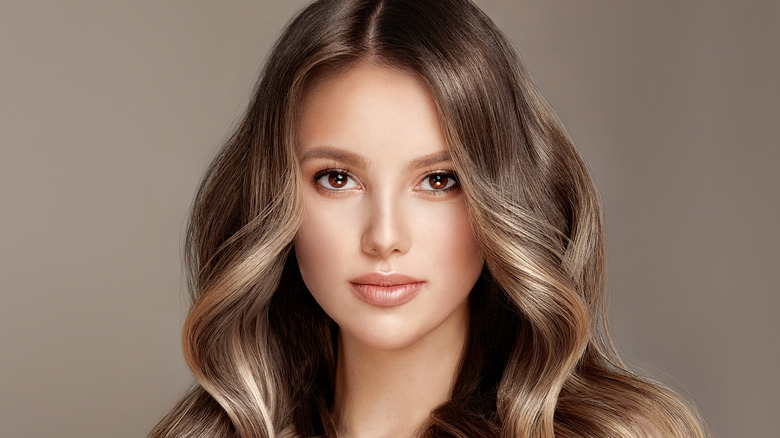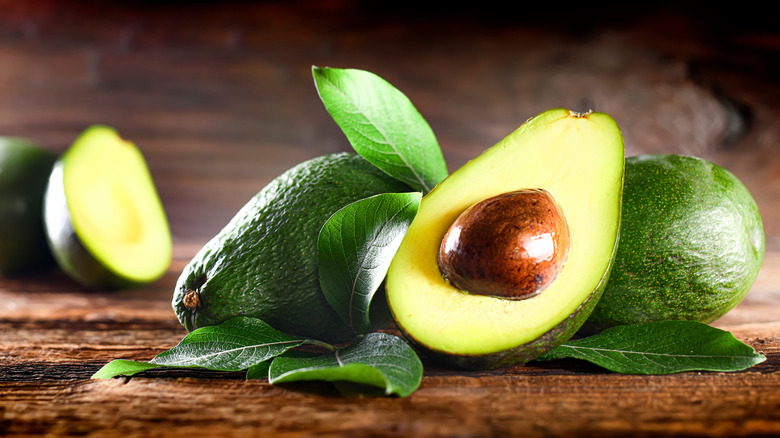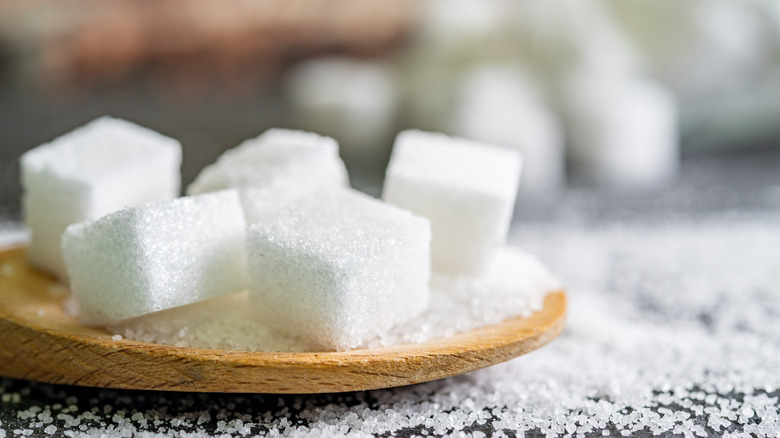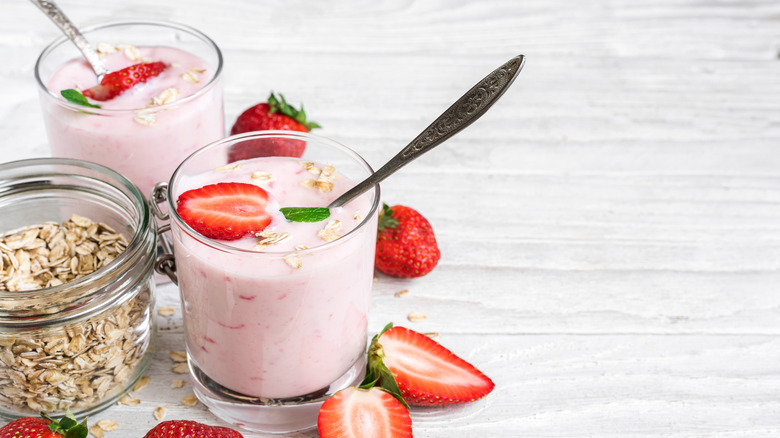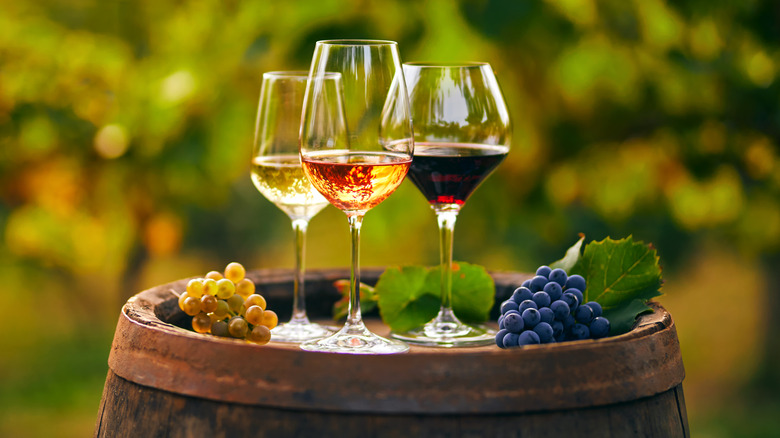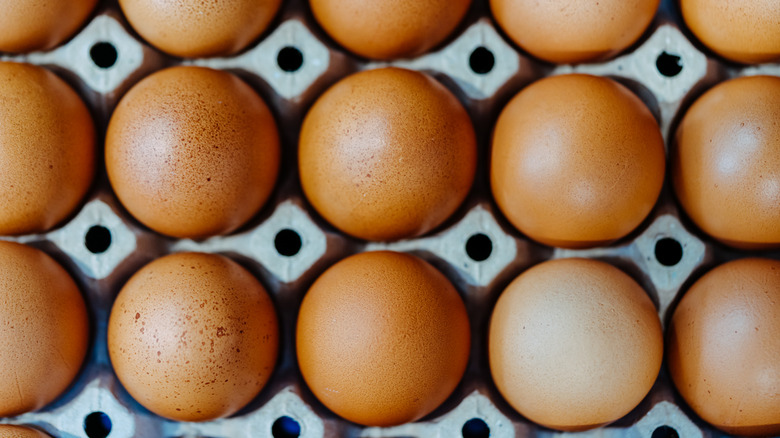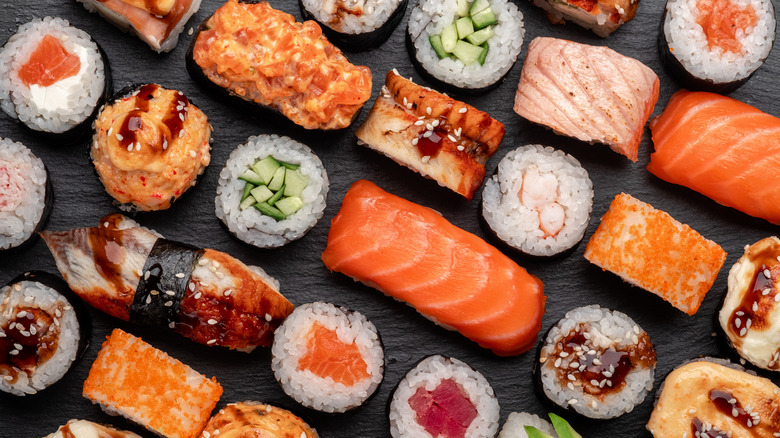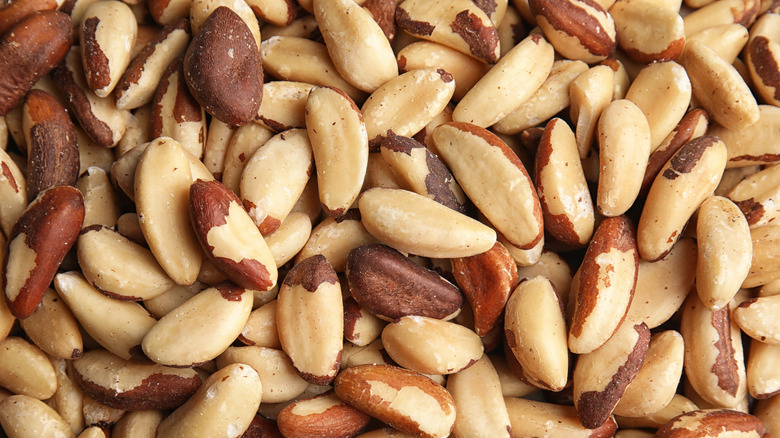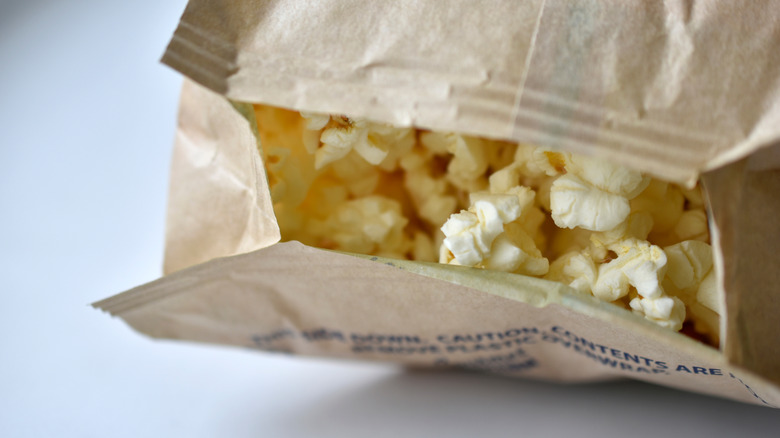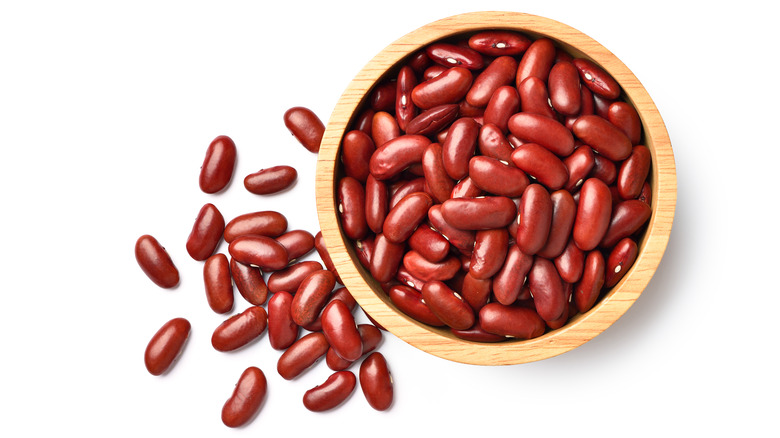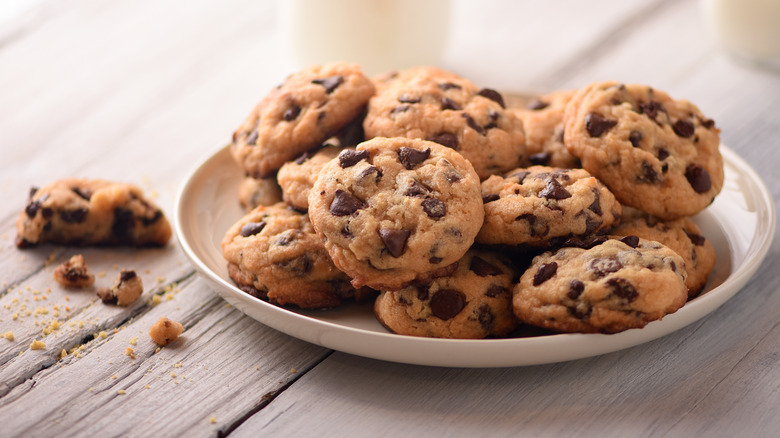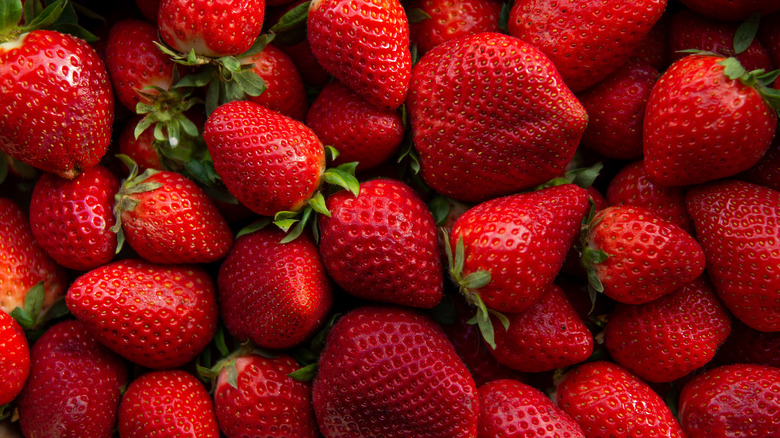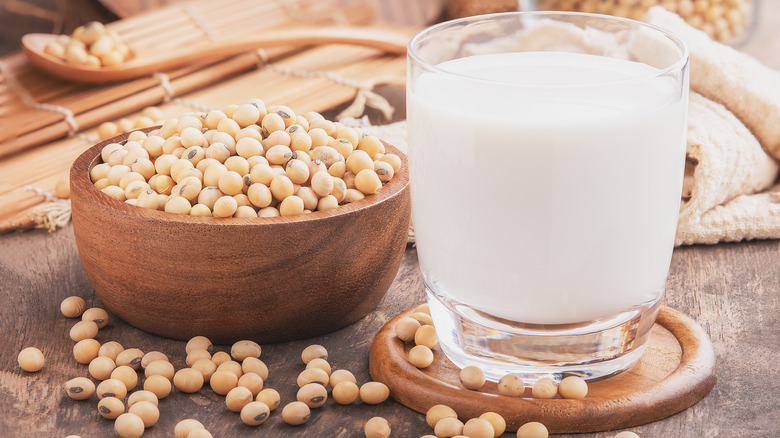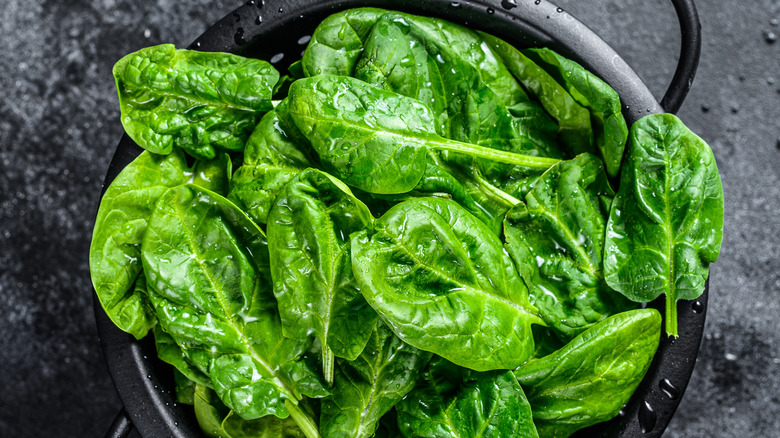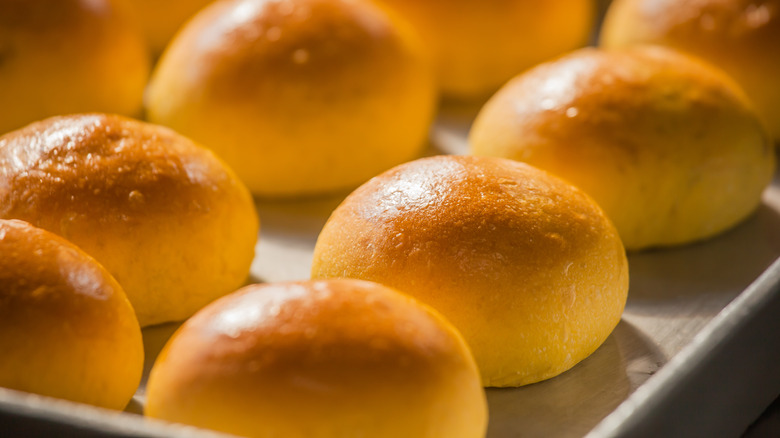7 Foods To Eat And 7 To Avoid For Healthy Hair
Hair can be a sensitive subject. The wrong cut, a poor style choice, a bad perm ... problems can range from being unsettling to upsetting. Even just an unruly bad hair day can throw off your mood. But it can be even more aggravating when your hair starts thinning, you begin losing more hair than usual, or your locks look dull and limp. And unlike a bad aesthetic decision, these factors stem from your overall hair health.
Your hair's health goes well beyond what you can see on the surface of your head, which brings us to an often overlooked factor when it comes to keeping your hair strong: diet. As the American Academy of Dermatology Association (AAD) explains, not consuming foods containing certain nutrients like zinc and iron can leave your hair weaker and more likely to fall out. In addition, some foods can actually be detrimental for your hair health and appearance. So, if your hair is concerning you, it might be time to visit your healthcare professional or a nutritionist to discuss how what you eat could be helping or hurting your do.
Eat: Avocado
From spreading it on toast to mashing it up into guacamole, the avocado is an popular fruit touted for its health benefits (via Medical News Today). And according to Healthline, it can help provide your body with two specific nutrients it needs to avoid (or at least lessen) hair loss and promote hair growth. And believe it or not, one of those nutrients is fat. Avocados are chock full of healthy fatty acids, which your body uses to create its cells, including hair cells (via Healthline). So, if you're not getting enough of this kind of fat in your diet, you could lose hair.
In addition to fatty acids, avocados are also packed with vitamin E, which research has shown can encourage new hair growth (via Healthline). In particular, vitamin E works as an antioxidant, targeting free radicals in the body that may be damaging cells and tissue (via Oxidative Medicine and Cellular Longevity). Upping your vitamin E consumption can help the skin cells on your scalp stay healthy, in turn helping your hair stay strong.
Avoid: Sugar
Sorry to all the sweet tooths out there, but unfortunately, there is data to support that sugar and hair loss (in both men and women) are connected (via Dr. Anthony Farole's website). Why this is the case, however, is still being debated. But initial findings point to insulin resistance — which can be brought on by eating and drinking large amounts of sugar — as a major factor when it comes to hair loss. As facial cosmetic surgeon Dr. Anthony Farole explains on his website, insulin is crucial for our bodies to break down sugar. This is why a person with diabetes might need to take insulin to prevent their sugar levels from escalating to damaging and dangerous levels. So if a person develops insulin resistance, then their sugar levels could be elevated and lead to hair loss and even balding.
Exactly why sugar has this effect on our hairline is unknown, but as Dr. Farole notes on his website, there are several theories. For one, sugar can impact hormone levels, which in turn, can affect how much hair our body creates. Another theory is that people may be eating sugary foods in place of healthier items that contain the vitamins and minerals that hair needs to stay healthy. In particular, sugary foods often don't contain protein, which it vital for our hair.
Eat: Yogurt
When we think about ways to make our hair healthier, we tend to focus on our scalp or on the hair itself. However, the true secret to keeping your hair full and strong may be located not in your scalp, but in your intestines. Yes, you read that right. Your intestines are filled with bacteria called probiotics — and these are good bacteria that are essential for the operations of your digestive and immune systems (via ABC News and Cleveland Clinic). But additionally, research from the Massachusetts Institute of Technology (MIT) found that probiotics might help prevent your skin's upper layers from becoming inflamed, which can lead to stronger, fuller hair follicles. Since yogurt also contains probiotics, it can help support these helpful bacteria in your intestines, in turn promoting healthy hair.
While yogurt in general can be beneficial for your do, Greek yogurt's high protein content makes it especially good for your hair, as your strands are 95% protein (via WebMD and Activilong). In addition, this type of yogurt is also a good source of pantothenic acid, or vitamin B5, which not only can help with cholesterol and rheumatoid arthritis, but also is good for your circulation (via WebMD and Mount Sinai). And the better your circulatory system functions, the more blood travels to your scalp carrying nutrients that support your hair's growth.
Avoid: Alcohol
If you like an occasional drink, don't worry. That shouldn't be an issue when it comes to your hair (via Healthline). Consuming large amounts of alcohol especially on a regular basis is another story, though there are still some dots science hasn't yet connected when it comes to alcohol and hair health. As Healthline explains, we don't definitively know why alcohol can contribute to hair loss in some people, but research supports a few theories. Some believe that drinking high quantities of alcohol can interfere with how your body absorbs copper and zinc, which are two important nutrients for your hair's health. If this theory is right, then alcohol could also lead to hair to turn gray too soon, since low levels of copper can cause your hair to lose its color. In addition, some researchers believe alcohol can prevent your body from properly absorbing protein, which is crucial to your hair's health. Besides possible absorption issues caused by alcohol, some data points to overconsumption of alcohol affecting a person's thyroid and hormones, which can also lead to thinner hair that's more likely to fall out.
Eat: Eggs
Whether you enjoy them scrambled, poached, sunny side up or in an omelet, eggs are undoubtedly staples of the breakfast table. And they're not only tasty — they contain a variety of nutrients that your body needs to keep your hair healthy and full. As WebMD explains, eggs are packed with protein, which is crucial for your hair. Remember, your hair is made of protein (via WebMD), so not taking in enough can result in your hair not growing as much or falling out altogether. Plus, eggs are a good source of the minerals zinc and selenium, both of which are important to keep your hair strong. But arguably one of the most important vitamins eggs can provide your hair is B7 (also called biotin) (via WebMD).
Why is biotin so important for your hair? Well, data shows that it can support your hair's health in a number of ways, including keeping your hair's color from fading. In fact, research has found that biotin can improve a number of hairdo concerns for women, ranging from hair loss to hair thickness and shine. And if that's not enough, biotin is also good for energy, as well as controlling your blood sugar levels.
Avoid: Fish high in mercury
Now, before we go any further, let's be clear about one thing. Fish can have many health benefits, as they contain protein, omega-3 fatty acids, and a number of vital vitamins and minerals (via Washington State Department of Health). With that said, not all fish are equally healthy, and when it comes to your hair, certain fish can actually contribute to hair loss.
As Manipal Hospitals' website explains, fish like swordfish and mackerels contain high levels of mercury, which has been connected to hair loss. In fact, the type of mercury found in seafood, methylmercury, is highly toxic to humans (via Medical News Today). Overindulgence can lead to mercury poisoning, which can cause serious problems like nerve damage, paralysis, problems with motor skills, and issues with memory and concentration. And the higher a fish is in the ocean food chain, the more loaded up with mercury it's likely to me — this is because sea creatures absorb mercury both through the water itself and via their own diets (when a larger fish eats a smaller one, that larger fish takes in mercury from its meal). So fish like shark, walleye, tuna, and bass should be eaten in moderation. Additionally, Manipal Hospitals website states sushi (which is made from a variety of sea life), can also be loaded with this metal. So, if you have concerns about thinning hair, you may want to skip that trip to the sushi-go-round (a.k.a. conveyor belt sushi).
Eat: Brazil nuts
Native to South America, Brazil nuts can be great for hair — as long as you don't eat more than four a day (via Medical News Today). And, no, that limit isn't because of their size, but rather because the amount of selenium they contain. But wait, isn't selenium a nutrient that's good for your hair (via WebMD)? The answer is yes ... and no.
On the one hand, your body's hair production needs selenium, so consuming the right amount of it can encourage new hairs to sprout (via Medical News Today). But consuming too much of this mineral can make your hair weak and more likely to fall out. And yet, you don't want to skimp on this nutrient, especially since it can also help keep your immune system strong, as well as lessen your chances of developing cancer and heart disease (via Mount Sinai). So, what is the right amount of selenium? Well, according to Medical News Today, adults should only consume at most 400 mcg/day. And if that sounds like a lot, know that a single Brazil nut can contain as much as 91 mcg of selenium, depending on how much selenium was in the soil where it was grown. Other foods like garlic and sunflower seeds are also rich with this mineral (via Mount Sinai).
Avoid: Foods high in trans fats
Did you know that when a food lists hydrogenated or partially hydrogenated oil as one of it's ingredients, it's really letting you known that it contains trans fats? The term "hydrogenated oil" comes from the process by which manufacturers combine vegetable oil with hydrogen, so it won't spoil as quickly (via Mayo Clinic). Unfortunately, altering vegetable oil like this has been linked to health problems, including male and female pattern baldness (via Everyday Health).
As Everyday Health explains, eating a great deal of trans fats can contribute to someone developing insulin resistance. Remember, your body needs insulin to properly process sugar. But if you become insulin resistant, then your body has difficulty breaking down sugar, which can lead not only to your hair falling out, but also to medical problems like heart disease and diabetes. Unfortunately, avoiding trans fats can be tricky since quite a few foods contain them. For example, anything you'd buy at a bakery or the bakery section of a supermarket that contains shortening also has trans fats (via Mayo Clinic). In addition, dairy and nondairy coffee creamers, margarine, and microwave popcorn in general all use partially hydrogenated oil (via Mayo Clinic and Healthline). And, of course, you may want to either cut down on or avoid fried foods and packaged snacks if you want to keep your hair healthy and strong.
Eat: Beans
Beans may have a reputation for being "the musical fruit," but these little plant seeds are powerhouses when it comes to not only your hair's strength but also your overall good health (via Medical News Today). For one thing, beans are a good source of amino acids, which your body uses to not only create its tissues, but also to repair any tissues that are damaged. This includes the tissues that make up your hair. Besides amino acids, beans also have high levels of a type of antioxidant called polyphenols, which can reduce your risk of developing cardiovascular issues and cancer. Plus, eating more beans might help you manage your sugar, keep your digestive system running smoothly, and curb overeating. In addition, breastcancer.org cites navy, kidney, and Great Northern beans as being excellent sources of omega-3 fatty acids, which according to WebMD can help keep your scalp healthy.
Avoid: Starchy foods
Shortening, like the kind used in baking, can be bad for your hair (via Mayo Clinic) — but, unfortunately, it's not the only ingredient commonly found in baked goods that has the potential to damage your do. As registered dietician Trista Best explains to SheFinds, certain carbs can also make your hair weaker and more likely to fall out (via Woman's World).
Now, before we go any further, it's important to understand that there are actually three different types of carbs (via Healthline). First there's fiber, which can have many health benefits. Next, there sugar, which can also be bad for your hairdo (via Dr. Anthony Farole's website). And finally, there's starch, which despite being a type of complex carb is often refined, making it more likely to raise your blood sugar (via Healthline and Woman's World). Okay, but how does elevated blood sugar cause problems for your hair? Well, for one thing, your body can become insulin resistant, meaning it cannot process sugar as well as it should, spiking your sugar levels. And the higher your sugar goes, the less well your circulatory system can transport oxygen to your hair, depriving it of an essential element it needs to stay healthy (Woman's World). Plus, the situation becomes only worse if you choose a carb-based product that has the trifecta of high starch, sugar, and alcohol.
Eat: Fruits
If you have a cold, chances are you'll start increasing your intake of vitamin C. But would you do the same thing if your hair became brittle? Or would you buy a new shampoo that advertises it's good for "dry and damaged hair?" According to Dr. Robert Glatter, assistant professor of Emergency Medicine at Lenox Hill Hospital in New York City, you might want to reach for strawberries instead of a strawberry-scented shampoo if your hair is unhealthy (via Insider). As Dr. Glatter tells Insider, fruits can contain high levels of vitamin C, which helps your body absorb iron. This helps support hair health and might lead to longer, stronger locks. And while Dr. Glatter says both fruits and vegetables can help you up your vitamin C intake, strawberries are an especially good source of it. In addition, he recommends mangoes and kiwis for a dietary vitamin C boost.
Avoid: Soy
Sadly, losing one's hair can be a natural part of the aging process (via American Academy of Dermatology Association). However, there are also ailments where hair loss is a symptom of a larger medical problem. Case in point, hypothyroidism, a health issue that might be exacerbated by eating and drinking soy (via Medical News Today).
Before we continue, let's talk about the thyroid. Located in our necks, this gland is responsible for hormone production and helps keep our metabolisms functioning properly (via Medical News Today). When a person develops hypothyroidism, however, their thyroid slows down, so their body is not getting the level of hormones it needs. As a result, they may lose hair not only from the top of their head but also from other areas like their legs and eyebrows. And some research has found soy might further disrupt how the thyroid creates hormones, which could worsen the effects of hypothyroidism.
Now, to be fair, occasionally eating soy might not be too much for your thyroid to handle and so might not lead to conditions like hypothyroidism and hair loss (via Medical News Today). With that said, if you have hypothyroidism, you might want to steer clear of certain soy products to help safeguard your hair. Some, of course, are obvious like soy sauce and soy milk, however, miso soup, tempeh, and tofu are also off the menu if you want to stick to a soy-free diet (via Healthline).
Eat: Leafy greens
Like so many parts of our bodies, a number of nutrients help to keep our hair heathy. And one of the most crucial of these nutrients is the mineral iron (via WebMD). In fact, if your iron drops too low, you could develop anemia, or iron deficiency, which can lead to your hair falling out. This is why incorporating the right amount of iron into our daily diets is so crucial for not only our hair, but our health in general. The good news is that foods like poultry and meat are rich with iron. But this also brings us to the not so good news: Not everyone can eat these foods because of factors like allergies or dietary restrictions. For example, chicken and beef are definitely not on the menu if you practice vegetarianism or veganism. Fortunately, leafy greens like spinach and kale are both excellent sources of iron to keep your hair (as well as the rest of your body) healthy. That said, as healthy as spinach and kale are, they can cause health risks if overconsumed (via Eat This, Not That!), so speak with your health care professional or a nutritionist about the right amount of each for your daily diet.
Avoid: Gluten
Now, let's be clear: The protein gluten is an issue for someone with a very specific condition called celiac disease (via Verywell Health). If you have this ailment, gluten causes a chain reaction that leads not only to your immune system attacking your intestines, but also to your hair falling out. As Verywell Health explains, there are two ways in which celiac disease and hair loss are connected. First, since this condition has to do with a malfunctioning of the immune system, it is classified as an autoimmune disease. Unfortunately, odds are high that a person with one autoimmune disorder may develop another, such as alopecia areata, which causes the immune system to attack hair follicles. They also may develop Hashimoto's thyroiditis, which can also cause hair to fall out. In addition, not getting proper treatment for celiac disease can lead to malnutrition, which can also be detrimental to one's hair.
While this may sound bleak, there is some good news. As Verywell Health explains, cutting the gluten out of your diet can not only help keep celiac disease under control, but may also help you grow your hair back. And with the many gluten-free foods on the market today, steering clear of this protein is easier than ever. However, if you suspect you have celiac disease, your first trip should be to your healthcare professional, not the supermarket.

